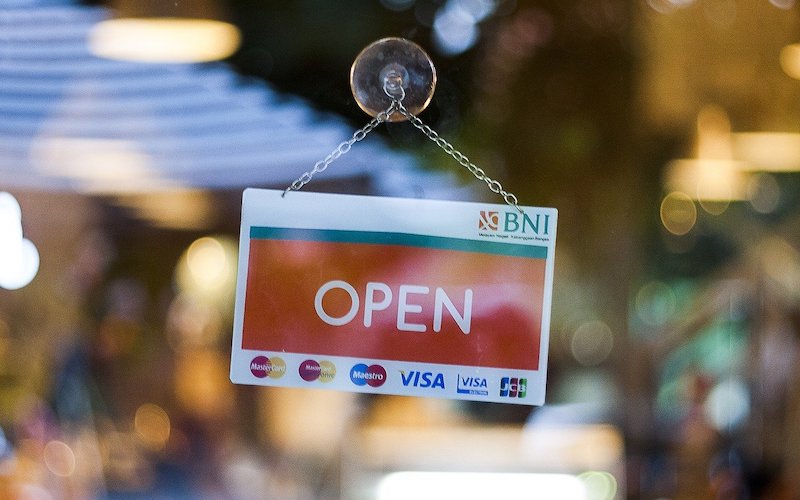With the right strategies in place, retail cannabis has huge opportunities in an e-commerce driven world.
The world of retail is changing rapidly. In the past couple of decades, the term “going shopping” alone has changed. It can now mean everything from driving to a shopping center to scrolling through Amazon to exploring the Facebook Marketplace. The dawn of online shopping has been an incredible strain on the world of retail, with malls becoming ghost towns and giant shops relegated to serving as Halloween stores once a year. The statistics back this up as well, with MSNBC reporting in April 2019 that online U.S. retail sales have eclipsed that of general retail for the very first time. Clearly, online shopping (once thought to be a passing phase) has changed the business landscape.
With all this doom and gloom surrounding traditional shopping, one would think it financially irresponsible to open a brick-and-mortar store of any kind. Well, unless you’re planning on opening your very own Radioshack or Toys R’ Us, that’s not exactly the case. One type of product has motivated retail sales in a surprising way: cannabis. According to Marijuana Business Daily, recreational retail sales of cannabis hit between $5.3-6.2 billion in 2018, expected to grow to up to $22 billion by 2023. Additionally, the publication has reported that some U.S. cities, such as Denver and Portland, have more marijuana-related stores than McDonald’s and Starbucks per 100,000 residents. Talk about e-commerce taking over all you want, but outnumbering such massive corporate giants has to account for something in the modern-day retail scene.
While clearly many types of traditional brick-and-mortar stores are on their way out, some leaders in the industry believe that cannabis may be the saving grace. According to Greg James, the founder of the publication Marijuana Venture, “Brick-and-mortar is here to stay in the cannabis industry. Like guns and booze, it will probably always be mostly brick and mortar for obvious reasons. Also, with brick and mortar you can give the customer a personal experience and offer advice at the store level. This is very important.” This “personal experience” does resonate with groups such as millennials, a demographic that, while seemingly opposed to traditional forms of shopping, emphasizes experiences.
However, it’s not just the experience that fuels offline shopping for cannabis products. Anat Baron, founder and CEO of Stashwall, Inc. and former head of Mike’s Hard Lemonade, claims that, “Because the industry is so young, there is a steep learning curve for consumers. The benefits of going to a physical location include discovery (seeing something you weren’t searching for or didn’t even know existed), the tactile ability to touch the product, and, most importantly, the ability to ask questions of a knowledgeable employee.” This rings especially true in the wake of growing legalization, as casual consumers may not have the basic understanding needed to make informed decisions.
However, just because cannabis presents a unique opportunity for retail doesn’t exactly mean that there aren’t issues along the way. Baron believes that “the biggest obstacle is finding and training qualified staff members to work in the retail locations. While there are some customers who walk in knowing what they want to buy, a bigger opportunity exists with consumers who are curious and can be converted to loyal customers. This requires real customer service skills combined with deep knowledge, which is challenging in an ever-evolving industry where new products and new laws are becoming status quo.” Considering that Leafly predicts 2019 to represent an overall 110 percent three-year growth in legal cannabis jobs, this need for educated, experienced customer service providers is becoming more and more vital.
This focus on having a top-tier staff also trickles down to many other aspects of running a cannabis business. Speaking on the topic of issues with cannabis retail, James echoes Baron’s perspective, saying, “Many are not particularly good at customer service or retention. Great retailers know their customer base, and drill down to who they are and what they want. For example, Costco and Nordstrom are both very different, with different business models and different customers. However they are both the best at what they do, and have refined their models to perfection. That’s one of the keys to retail: know your customer and get really good at servicing them.”
The days of driving down to the old Mom-and-Pop store to purchase knick knacks or walking around the mall all day for a shopping spree might seem more and more like relics of the past. While traditional retail is by no means dead, it’s in a definite state of flux, one that might not be beneficial for bookstores or sports equipment shops, but presents huge potential for the overall cannabis space. In a changing world fueled by technology, cannabis is in an interesting spot, bringing new life to traditional retail methodology. James, who mentioned that he himself had purchased from a Ferrari dealership once a customer service-focused family took over the business, revealed one of the keys of successful retail: “Gimmicks rarely work. Great customer service and prices always do.” Interestingly enough, this could apply to a classic car dealership and a modern dispensary alike.







